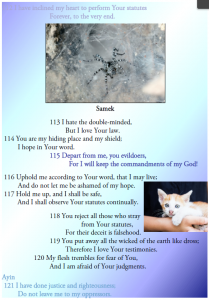 The Samek section includes a unique verse: Verse 115 is the only one of the psalm (after the introductory verses 1-3) that is not addressed to God. This verse is also marked by the only occurrence in the psalm (in the NKJV and most other versions) of the word “God.”
The Samek section includes a unique verse: Verse 115 is the only one of the psalm (after the introductory verses 1-3) that is not addressed to God. This verse is also marked by the only occurrence in the psalm (in the NKJV and most other versions) of the word “God.”
It was with a little trepidation that I began writing a melody for the Samek section to help my ten-year-old daughter, Andrea, memorize these verses. The songs I write for Andy tend to be simple and upbeat. Three chords, none of them minor–just a happy tune to help the verses stick in her head. This would not be a typical kid song, though; when it comes down to it, do you really want your kids walking around the house, chirping “I hate the double-minded”?
Of course, there’s much of devotion to God and his word in these eight verses, too. The psalmist repeatedly bounces between the themes of rejection of the wicked (113, 115, 118, 119) and steadfast love for God’s word (114, 116, 117–as well as the second halves of verses 113, 115, and 119). And I suppose that now is as good a time as any for Andrea to begin to learn that devotion to God will mean going a very different direction from that of those who do not love him. I hope that one day she has the simple but profound maturity demonstrated in verse 115–that when others tempt her to do wrong, she just says, “Go away, I’m busy!” and continues following God’s path.
The dismissal of the wicked is, in the end, another way for the psalmist to express his love of God. He rejects them (113 and 115) because God rejects them (118, 119). “You reject all those who stray from Your statutes, For their deceit is falsehood.” The wicked are caught in their own web; they are the deceived as well as the deceivers. “Their deception of others is a lie to themselves,” says J.A. Alexander. This is a wearying deception, a never-ending series of shortcuts that turn into dead ends.
All godless life is a blunder as well as a sin, and is fed with unrealisable promises.
–Alexander Maclaren
The “therefore” of verse 119 could serve one of two purposes. The psalmist could be saying either “I love Your testimonies so that I don’t suffer the fate of the wicked,” or “I love Your testimonies because of the way you faithfully judge the wicked.” As Alexander notes, “The purifying tendency of God’s judgments is itself a reason for delighting in them.”
As I began writing Andrea’s song with fear and trembling, it’s appropriate that we end it with fear and trembling in verse 120. This is, again, not a typical subject matter for a children’s praise song; but it seems to me that it’s a fitting and necessary ending to the section (and to the song). The punishment of evildoers should inspire in us a reverent fear. Does God reject the wicked? Let us remember, then, to avoid their false ways as we would avoid their condemnation. Have we escaped that condemnation? Then let us remember that we have only escaped because of God’s grace, because of his continuing goodness to us in spite of our failings and our sin.
Image courtesy of tharkul / FreeDigitalPhotos.net
